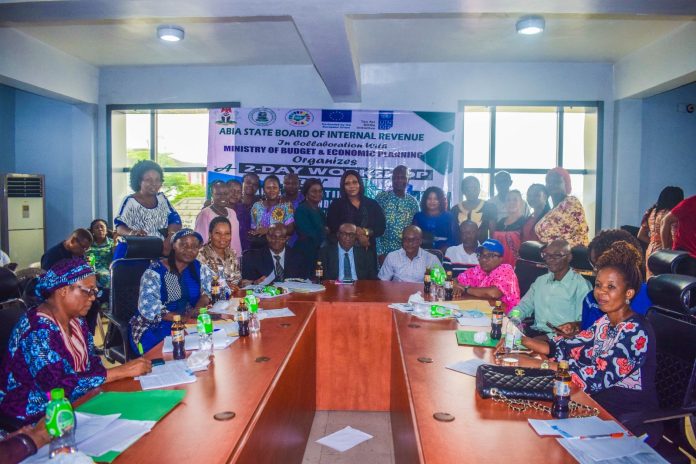The Abia State Board of Internal Revenue in collaboration with the Ministry of Budget and Economic Planning organized a 2-day workshop on Governance, Reporting, Evaluation of Tax Expenditure for Tax Enumerations in Abia State at the Conference Hall, Investment House, Umuahia. The workshop was scheduled to hold on Thursday 2nd and Friday 3rd of May, 2024. Some sponsors of the workshop include, Tax for SDGs Initiative, United Nations Development Programme (UNDP), Office of the Senior Special Assistant to the President: Sustainable Development Goals and co-founded by the European Union.
The first day of the workshop, which was initially scheduled to start at 9am, began at 12pm GMT due to unforeseen circumstances, and delays in participants coming from very far LGAs. Despite the delay, a total of 56 persons were in attendance, including notable dignitaries such as the Chairman of the Board of Internal Revenue, Abia State, Prof G. Udochukwu Ogbonna, and others.
The workshop commenced with an opening prayer led by Mr Ukonu Kalu, followed by an opening speech delivered by Mrs Helen Ify Mekowulu (PRO BIR). In the absence of Prof Ogbonna, his representative, Mr. Chijioke Okorinka, delivered the chairman’s opening remarks.
After the chairman’s speech, the lecture series began, with the aim of maximizing time. Prof Wilson Ani delivered the first lecture, titled “Achieving Effective Tax Administration in Nigeria: Strategies and Best Practices in Abia State”. Prof Ani in the Dean, College of Management Sciences, Michael Okpara University of Agriculture, Umudike, a Fellow in the Institute of Accountants Nigeria.
In his lecture, Prof Ani comprehensively addressed the current state of tax administration in Nigeria and Abia State, highlighting the challenges that hinder effective taxation. He also presented statistics on taxation in both Nigeria and Abia State, and proposed strategies to improve tax administration in Abia State.
Prof Wilson Ani emphasized the significance of taxation for economic development and public services. He emphasized on the tax being an obligation not an option. He highlighted Abia State’s progress in fiscal performance, noting that it ranked 15th among Nigeria’s 36 states, an improvement from 18th place in 2022. However, he stressed that the state needs to enhance its internal revenue generation.
To boost the effectiveness of the training workshops, Prof Ani suggested that participants receive certifications upon completing examinations at the end of each session. This, he believed, would encourage attendees to be more engaged and invested in the training.
Furthermore, he recommended that the knowledge gained from the training be disseminated to the grassroots level, ensuring that the concepts discussed are properly implemented. By doing so, the state can maximize the benefits of taxation for economic development and public services.
The second lecture of the day, delivered by Dr. I. Promise Ujah, focused on the topic “Taxing the Informal Sector in Nigeria”. Dr. Ujah defined the informal sector as comprising businesses without formal registration, such as street vending, artisanal production, service-oriented businesses, and small and medium-scale enterprises.
He highlighted the challenges of taxing the informal sector, including:
– Inadequate enforcement mechanisms
– Administrative and capacity constraints
– Limited documentation
To address these challenges, Dr. Ujah presented various strategies for taxing the informal sector, including:
– Simplified taxation systems
– Technology adoption
– Voluntary compliance incentives
– Flexible policies
– Awareness and education
He also shared case studies and success stories from countries like Rwanda and Thailand, which have implemented some of these strategies.
In conclusion, Dr. Ujah recommended policies to support taxation of the informal sector, including:
– Simplified tax regimes
– Straightforward tax assessment procedures
– Provision of tax credits.
